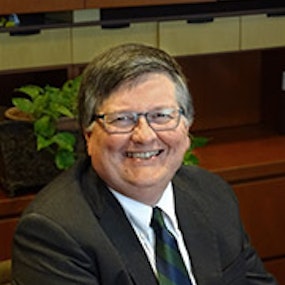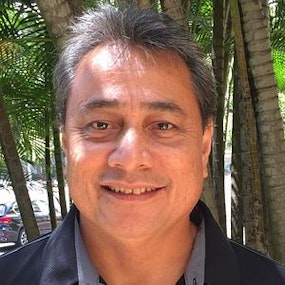JANSON SILVERS:
This is Public Health Review Morning Edition for Wednesday, July 5, 2023. I'm Janson Silvers. Today, an encore presentation of one of our most popular episodes of the newscast from the Association of State and Territorial Health Officials.
DANIEL EDNEY:
It's fairly readily available to veterinary access points and not tightly monitored in terms of getting into the general public, but it's a large animal tranquilizer. It's a non-opioid.
JOHNSON:
Mississippi State Health Officer Dr. Daniel Edney on xylazine, a drug used by veterinarians now a popular additive to other illicit formulas available on the street.
EDNEY:
So, fentanyl is very powerful. It's very cheap but has a short biologic serum half-life. Typically, depending on how tolerant the person is, it's going to be one to three hours in terms of its most intense duration. So, our heroine and fentanyl users have learned that with xylazine, they can extend that half-life, and potentiate the high for up to six hours, which is a very tantalizing prospect.
JOHNSON:
Edney says people who've taken drugs laced with xylazine don't have many treatment options.
EDNEY:
We don't have a way to reverse xylazine. But what we instruct those who are providing emergency services, if you see what appears to be an overdose, go ahead and administer Narcan. But if they're totally unresponsive after two doses of Narcan and you need to suspect xylazine. At that point, you just keep them alive, you intubate them and give them IV fluids support them until the drug wears off.
JOHNSON:
Edney adds it's critical that everyone in public health and health care learn about the drug and how to know when someone has taken it.
EDNEY:
So, the prevention issue for us is education, and getting the word out to those who provide emergency services, first responders and the physician community at large. Very importantly, the addiction medical community so that they understand that we have another pharmacologic agent, that if it's not here today, it will be here tomorrow.
JOHNSON:
ASTHO has a new blog article with more information about xylazine and how to approach the problem. You can read the article using the link in the show notes.
ASTHO's island members want help covering the medical costs of their U.S. military veterans who often are forced to travel 1000s of miles for health care when veterans administration services are not accessible at home. Several territorial health officials were in Washington D.C. recently to make the case for federal support that would allow more veterans to stay on island for their care. Moses Pretrick is the Assistant Secretary for Health in the Federated States of Micronesia.
MOSES PRETRICK:
Many of our citizens served in the U.S. Armed Forces. But I think when they're done when they're returned back home, we still have this issue of accessing, you know, health care, you know, for those veterans, as well as other some other benefits of being a veteran of the U.S. Armed Services. So, we're working with ASTHO, hopefully, they can help us out, figure out this more with Washington. And hopefully, you know, some solution can be reached where our veterans can realize the VA benefits that comes with it.
JOHNSON:
So that would be either having a VA facility in the islands or getting reimbursed for their coverage, their care, if they go to a provider in the community, right?
PRETRICK:
Yes, that's correct.
JOHNSON:
Yeah. How important of an issue is that to people in Micronesia?
PRETRICK:
Well, it is very important, because, you know, as we understand, I guess, per capita, we have probably the most people that are enlisted in the U.S. Armed Forces. And we've had people that have returned back home, and some of them, you know, still required to, you know, they're insured and stuff like that. And so, they're really required to, you know, access health care, you know, for their injuries, as you know, not only that, but I guess for on mental issues, emotional issues, and we lacked the sort of specialties or expertise back home to address their unique health issue. So, we think it's very important. We continue to see many of our citizens being enlisted in the services, so we think it will continue to grow. And so, we definitely need support for them when they're finished and return home.
JOHNSON:
So, I may have put words in your mouth earlier. So, I want you to tell me, what would you like to see happen as it relates to services for the veterans, what is your ideal solution there?
PRETRICK:
So, I think, what we are, at least proposing is, at least, if some kind of an assessment can be done back home. Either bid, for instance, I will be talking with the Chief Information Officer (CIO) this evening bid them to, or even the VA to come out and actually assess and see what we have and help us determine how to go about this. And I think some of the thoughts that we have is, if there's a way, maybe a veteran kind of medical team can also come out, meet with our veterans back home and, you know, understand what their exact needs are. And see, you know, how they can also resolve this issue of, because I think our citizens right now are our veterans. When they go seek medical services off island, you know, they actually would pay for their airfare to fly to Hawaii and other transportation costs, which, to my understanding, they're not reimbursed for, so if at least maybe we can begin with that if there's a way that this issue of accessing health care, off island can be resolved, where they don't have to pay out of their pocket or if they can be reimbursed. I think that would be a good start for us here.
JOHNSON:
What else would you like to ultimately try to accomplish in this area, beyond covering their transportation off, you know, out of the country, or to Hawaii or wherever they need to go? Are there other goals as well, that you'd like to see come to pass at some point?
PRETRICK:
Yeah, I mean, if, at some point in the future, if a federal ends clinic can be established, or one of our clinics back home can be recognized by the fee as the clinic to serve these veterans, and so that way they can access their full benefits from, you know, as a federal, you know, I think that that is one of the goals that we would like, and it's not only health benefits, but we understand back home, you know, our veterans, they can also access the benefit of using their G.I. bill to support them in education. So, understand some of them at our college of Micronesia, they're able to use that which is great. Housing, to my understanding, you know, it's one that has not been resolved and so they there are also other issues around it. So, for some reason they are not eligible to receive or get maybe loans for housing for themselves. You know, as a veteran unemployed.
JOHNSON:
For more information, visit ASTHO's Island Area's webpage, you can find the link in the show notes. Also today, your opportunity to learn about the latest public health technology is coming up soon. O'Keyla Cooper has more.
O’KEYLA COOPER:
Public health leaders and experts are invited to attend this year's Public Health TechXpo and Futures Forum to discuss the challenges and potential solutions for modernizing the U.S. public health system. This hybrid event will be held in person in Chicago, May 23rd through 25th and seating is limited. Early bird registration ends March 31st. If you can't make it to the "Windy City" this spring, no worries. Virtual registration is also open, and the agenda is being added to weekly. Regardless of how you decide to join us, this year, the TechXpo will have an additional virtual event on June 15th. For all registration registered today. More information can be found using the link in the show notes.
JOHNSON:
Finally, this morning ASTHO's Health Equity Summit is happening next month in Atlanta. The event theme this year is "Creating A Movement for Justice". You can find out more about the two-day meeting using the link in the show notes.
That'll do it for today's newscast. We're back tomorrow morning with more ASTHO news and information. I'm Robert Johnson. You're listening to Public Health Review Morning Edition. Have a great day.






